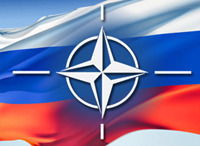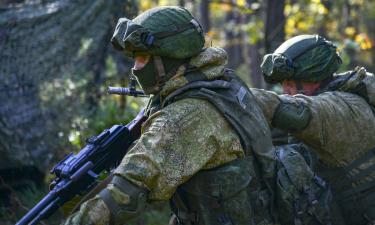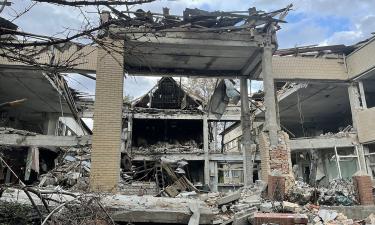NATO's squid tries to flex his tentacles in Russia
 NATO Secretary General Anders Fogh Rasmussen arrived in Moscow November 2. The focus of his talks with the Russian leaders is the preparation for the NATO-Russia summit scheduled for November 19-20.
NATO Secretary General Anders Fogh Rasmussen arrived in Moscow November 2. The focus of his talks with the Russian leaders is the preparation for the NATO-Russia summit scheduled for November 19-20.
The relations between Russia and NATO in recent years seem to have evolved incrementally. Russia-NATO Council met at the ambassadorial level, and at the level of Foreign Ministers. The differences have not disappeared, but it seemed that they were not dominating the relations. On the contrary, there have been increasingly more talks about the intentions of Russia and NATO to closely cooperate on Afghanistan.
At the same time the signals that were coming from Rasmussen were highly controversial. On the one hand, in September, he proposed the creation of a common anti-missile shield from the Canadian Vancouver to Vladivostok. Secretary General of NATO said that Russia needs to be involved in the creation of a pan-European missile defense system.
However, further disagreements began. Rasmussen has repeatedly made it clear that a new treaty on European security that Russia insists on signing is not necessary. He justifies it by the fact that NATO has been and always will be the basis of the security on the continent. Therefore, the system EUROPRO should be the only an addition to the NATO concept of nuclear deterrence.
There is another complex issue. Russia has repeatedly made it clear that NATO should renounce the deployment of nuclear weapons on the territory of the former socialist forces in Eastern Europe. This is a fair requirement because NATO nuclear missiles a couple of hundred kilometers away from St. Petersburg are unlikely to improve the trust between Russia and NATO.
A chorus of voices immediately came from the Baltic countries stating that Russia wants to reassert its influence in Eastern Europe. However, Rasmussen has repeatedly said that nuclear weapons will not appear in the immediate proximity of the Russian borders. He spoke in the same way yesterday when he mentioned that the intention declared earlier is to remain in full effect as NATO always keeps its word.
Yet, there were some things the secretary general of the alliance chose not to talk about. First of all, that Americans intend to deploy elements of their missile defense system in Romania in the future. The distance from its Black Sea coast to the Russian coast is less than a thousand kilometers, and only five hundred kilometers to the Russian base in Sevastopol. It turns out that Rasmussen cannot or is not willing to provide any guarantees that the U.S. nuclear-missile shield will not be deployed near the Russian borders.
In addition to nuclear weapons, there are also regular ones. Russia could ask NATO a few unpleasant questions regarding this issue. Lithuania, Latvia and Estonia who are the members of the alliance, are not the parties to the agreement of two decades ago on Conventional Armed Forces in Europe (CFE). And if so, they could theoretically be used as an uncontrolled storage of conventional weapons on Russia's borders and stationing of an unlimited number of NATO troops on their territories.
But the issues with NATO in this area remain acute. Rasmussen said nothing about the fact that the Baltic countries may accede to the CFE Treaty. Strictly speaking, neither Lithuania nor Latvia or Estonia have expressed their willingness to sign the document. There has been no obvious pressure on the Baltic countries on this issue from the countries representing the pillars of the alliance.
Russia can ask the same questions about three other countries - Slovenia, Croatia and Albania. The only reason these questions are not asked is because they are located further from the Russian borders and weapons storage on their territories does not present such potential danger for Russia as the Baltic "issue." Nonetheless, this is a legal loop that NATO can use against anyone.
Finally, let's remember the story of the adapted CFE Treaty, signed in 1999 with the new realities (especially the expansion of NATO) in Europe. It has only been ratified by Russia, Ukraine, Belarus and Kazakhstan. Western countries are still impeding the entry of the document into the effect saying that Russia must withdraw its troops from Georgia and Moldova.
However, there are no Russian soldiers in Georgia (South Ossetia and Abkhazia are a topic of a separate conversation). The last Russian troops have left there in 2006. Transnistria only hosts Russian peacekeepers stationed there with the consent of the UN and the OSCE. There are no Russian military bases in Bessarabia or Transnistria. This makes the excuses for failure to ratify the Adapted CFE Treaty produced by NATO countries seem far-fetched.
Seeing that Russia fulfills the document unilaterally, Russian leadership in late 2007 decided to suspend its obligations under the adapted CFE Treaty. NATO countries have repeatedly expressed regret over the actions of the Russian government. Yet, they do not intend to ratify the treaty. This means that the Russian Federation has plenty of questions to Rasmussen, and so far he has not provided the answers.
What can Russia do about it? Pravda.ru asked Dmitry Rogozin, permanent representative of Russia for NATO.
"Russia does not intend to immediately give Rasmussen answers to most questions of interest to the Alliance. We should carefully consider while making decisions, whether a particular proposal is attractive for us. It addresses issues such as joint missile defense and the withdrawal of troops from Transnistria.
One thing is clear: we are ready to cooperate with NATO on Afghanistan in the fight against drug trafficking, because the heroin flow primarily threatens us. But the management of the alliance should clearly understand that we are not going to bring troops into Afghanistan. This is absolutely ruled out."
Sergei Balmasov
Vadim Trukhachev
Pravda.Ru
Subscribe to Pravda.Ru Telegram channel, Facebook, RSS!





